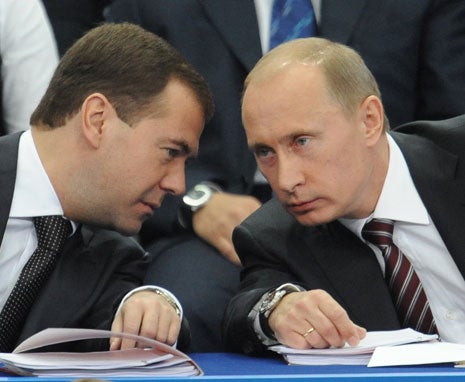Major Garrett, a White House correspondent for National Journal, recently authored a piece that seeks to shed light on President Obama’s true missile defense intentions and is a welcome addition to the public discussion.
On the eve of a global nuclear security summit in Seoul, South Korea, President Obama whispered to Russian President Dmitry Medvedev that he needs “space” until after the U.S. presidential elections and assured more “flexibility” in regards to missile defense. Unbeknownst to President Obama, his comments were being recorded by a press microphone that he thought was turned off.
Garrett keenly suggests President Obama’s gaffe could function as an “equally delectable feeding frenzy” for the media. Garrett highlights the reactions of leading foreign policy analysts to such a blunder and what this reveals about the President’s upcoming missile defense plans.
Heritage’s James Carafano says that “Obama’s remarks betrayed his real approach to arms control and ballistic-missile defense.” Andy Kuchins, director of the Russian and Eurasia program at the Center for Strategic and International Studies, asserts that Obama’s mistake “has really opened him up to that kind of criticism of being ready to capitulate.”
The possibility of submitting to Russian demands is unsurprising considering President Obama’s track record. This is intolerable, given Russia’s repeated appeals for veto power over Washington’s decisions to intercept a ballistic missile traveling toward its victims and legal binding limitations, including the speed and geographical coverage of U.S. interceptors. Senator Jon Kyl (R–AZ) recently penned a letter objecting to the President’s indications that he might favor Russian concerns over his duty to defend Americans against foreign military threats.
This predictable revelation of President Obama’s perspective on missile defense could not come at a worse time. A nuclear-armed North Korea is showing increased preparation for a controversial rocket launch that appears to be another test for a long-range missile. Iran is emerging as a regional nuclear power capable of threatening U.S. interests and allies. At the same time, Russia and China have been deploying innovative nuclear capabilities regularly while, contrastingly, the U.S.’s nuclear program is steadily declining due to lack of a much-needed modernization plan.
The increased proliferation of threats, coupled with President Obama’s looming capitulation to Russia on missile defense, makes the U.S. more vulnerable to ballistic missile attack.
Bryan Kimbell is currently a member of the Young Leaders Program at The Heritage Foundation. For more information on interning at Heritage, please visit: http://www.heritage.org/about/departments/ylp.cfm































